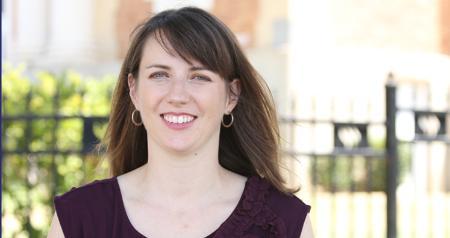Using Microbiology to Help Make Food Safer

Here’s a topic might know a little about: Food. But how do you know that the cantaloupe you’re slicing up or the burger you are about to eat is safe?
Angela Roberts, assistant professor of biology, knows. She is a microbiologist who studies food safety.
So, how does a food safety expert grocery shop? “No particular way,” Roberts said. “Actually, I hate grocery shopping. I make my husband do it.”
Teaching Students the Value of Food Safety
Roberts is Texas Wesleyan’s co-principal investigator under a U.S. Department of Agriculture grant worth $2.5 million, split between seven universities. This is the grant’s second year.
That’s a lot of words, but what the grant does is allow for a program where undergraduate students do food safety research under the supervision of a faculty member.
The program speaks to the need for more people – especially those with doctorate and master’s degrees – to work in food safety. As part of the grant, she also holds a workshop that provides area high school teachers with food safety lesson plans.
For students, a project is hands-on and intensive. They don’t just read about microbiology, they actually get to do microbiology in a hands-on setting.
It’s hands-on learning opportunities that probably account for the success of biology students at Texas Wesleyan. This year, five students competed at the National Competition for Beta Beta Beta, the national biological honor society, in Puerto Rico. One student, Truc Nguyen, won first place in the microbiology poster competition with a food safety project.
“My favorite thing is getting students involved in opportunities like research projects,” Roberts said.
Why Food Safety Matters to Everyone
As food distribution becomes more centralized – say there is a location that many tomatoes pass through on their way to your supermarket – the risk of a widespread contamination becomes more possible.
Contamination outbreaks grab headlines. It’s the job of people food safety experts to research them, and, hopefully, to help prevent them.
Food safety experts are sometimes detectives who use research to find the root of the problem. They might study the data – using modern tools like DNA fingerprinting – to discover a plant worker’s gloves are causing the problem, or maybe even floor mats in the plant.
Why does that matter?
“We would all like to eat confident that we’re not going to vomit,” Roberts said.
How Do You Become a Food Safety Expert?
Roberts’ scientific desires didn’t begin with food safety. A Montana native – miles away from any ocean – she wanted to be a marine biologist.
But as she became more involved with her undergraduate studies at St. Mary’s College of California and her graduate work at Cornell University microbiology – and food safety – began to interest her. “I had the experience we’re trying to give to our students,” Roberts said. “I worked on a microbiology research project one-on-one with a faculty member. It changed my life.”
She says that time at St. Mary’s – a small school – is one of the reasons she prefers the learning culture of Texas Wesleyan.
“Faculty mentorship is really critical for a student,” Roberts said. “In science, it increases their persistence. It’s the epitome of active learning.”







